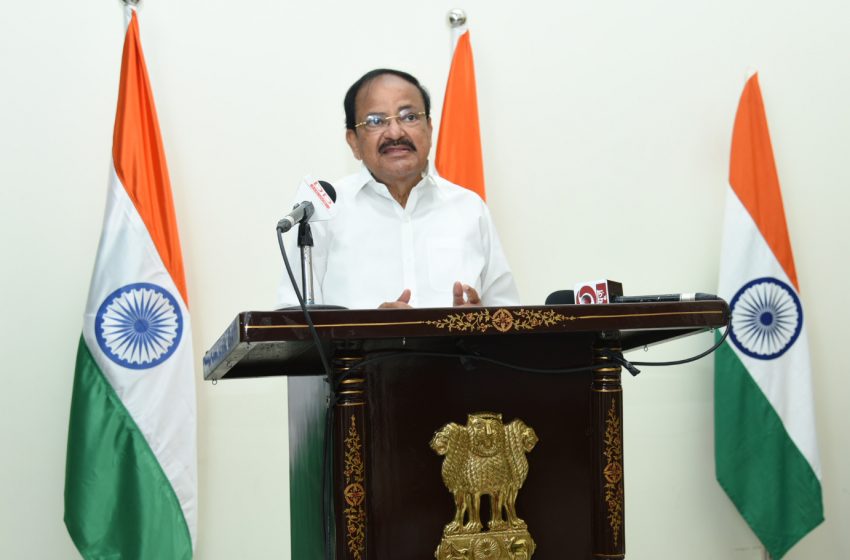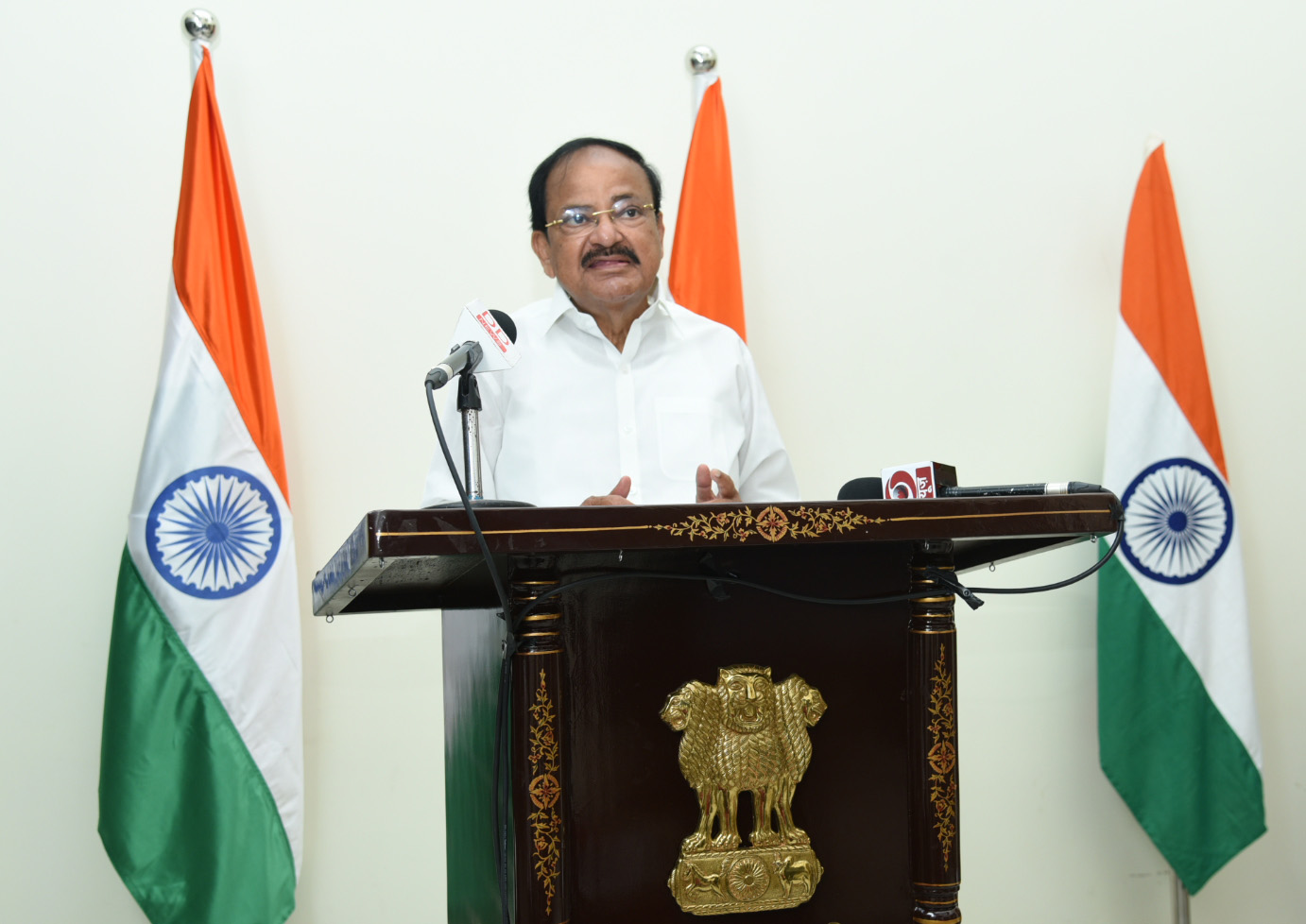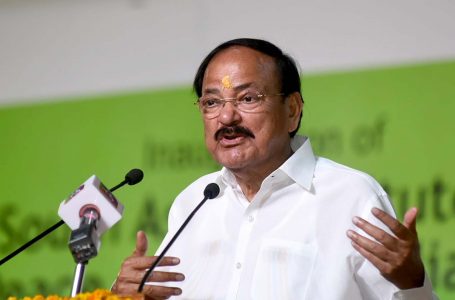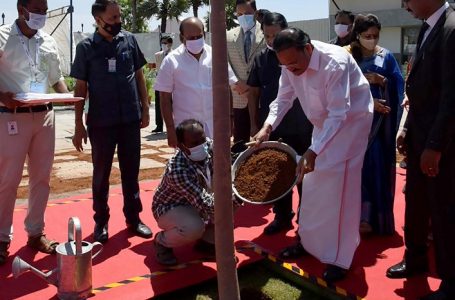Media in crisis, auto-correction needed: Venkaiah Naidu

The Vice President, Shri M. Venkaiah Naidu virtually delivering the M.V. Kamath Memorial Endowment Lecture, from Hyderabad on December 18, 2020.
- Tech giants shall share revenues for using the products of traditional media for fairness
- Millions still wake up with morning coffee and news paper despite growing instant journalism
- Naidu urges media to focus on triggers of development and change
- Calls for sanity in the use of social media to stall spread of fake news
- Lauds contributions of veteran journalist late M.V.Kamath

New Delhi, Dec 18, 2020: Expressing concern over the future of media and journalism and the sanctity of news in the face of disruptive technological advances, Vice President of India and Rajya Sabha Chairman M. Venkaiah Naidu urged all the stakeholders to ensure credible journalism since media is an effective tool of empowerment of people for informed public discourse.
Naidu spoke at length on “Journalism: Past, Present and Future’’ while delivering the M.V.Kamat Memorial Endowment Lecture in virtual mode from Hyderabad today.
Naidu said; “Yellow journalism seeks to cloud the facts by resorting to eye-catching headlines and promotes distortion and misinformation. Journalism based on taking up false crusades as witnessed in the case of suicide of a film actor recently, is a fellow traveler. Both are aimed at increasing readership and viewership and should be avoided.”
The Vice President voiced concern over the implications of the growing ‘instant journalism’ triggered by the emergence of Internet and social media expansion in the form of propagation of fake news and erosion of journalistic norms and ethos. He further noted that technology giants have emerged as algorithmic gatekeepers of information and the web emerging as the main distributor of news.
The Vice President, in particular, referred to the financial implications for the traditional media like the newspapers with their journalistic products being leveraged by technology giants and not sharing the revenues with the concerned. He noted that the Internet has disrupted the revenue and reporting models with serious implications.
He stated that the information and reports generated by the print media at substantial cost is being hijacked by the social media giants.
“This is unfair. Some countries are taking measures to ensure revenue sharing by the social media giants with the print media. We too need to take a serious look at this problem and come out with appropriate revenue sharing models for the survival of traditional media,” he said.
Welcoming the democratisation and decentralisation of sharing of information and views enabled by rapid expansion of social media, Naidu expressed concern over the downsides of it in the form of news getting devalued amidst information saturation and over abundance of news.
“There is a certain need to ensure sanity in the use of rapidly expanding social media outlets given the implications for social harmony, common good, peace, and national security. Freedom of expression doesn’t mean unfettered outburst of anger and hate against each other that may lead to chaos,” he added.
Referring to the role of media in reporting and analysing the socio-political and economic transformation of the country, Naidu urged the media persons to be consistent in reporting such change instead of using different yardsticks for different periods. “I am not suggesting media to be like a chameleon. Media should use a standard set of reporting and analytical tools that capture the change without imposing respective positions. Media should not be seen by the public as discrediting the change that is happening since such a change is contrary to their long-held positions,” Naidu said.
Referring to the crisis situation being faced by the media and journalism for various reasons and uncertain future amidst disruptive changes, Naidu stressed that an ‘auto-correction’ in needed and in fact, inevitable for a better future. He suggested enabling guidelines and regulations for restoring order while expressing himself against any restrictive regulations.
Naidu also urged the media to give adequate attention to reporting on developmental efforts and outcomes by examining and analysing the triggers of change, partnerships built and participation of people and other stakeholders, challenges faced and the way they were overcome etc. “This kind of positivity reinforces the trust of the people in the institutions of our body polity” he said.
The Vice President urged the media persons to keep news and views strictly separate without allowing each of them masquerading as the other. He also stressed the need to stem the decline in journalistic values and ethos. He recalled that late Shri Kamath although maintained this distinction between news and views.
Hon’ble Pro Vice Chancellor of Manipal Academy of Higher Education (MAHE) Dr. H.S. Bhallal, Vice Chancellor Lt. General M.D. Venkatesh, Director of Manipal Institute of Communication Dr. Padma Rani and members of administrative and academic departments were among those who attended the event.




